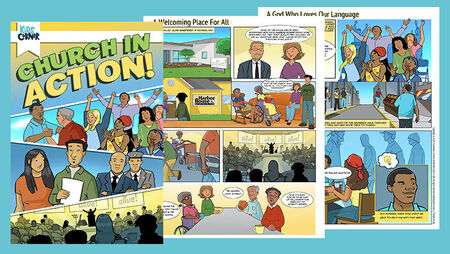
Curiosity is a Gift to Give
Bible Verse
12 Let me ask you this. What would you do if you had 100 sheep and one of them wandered off? Wouldn't you leave the 99 on the hillside and go look for the one that had wandered away? Matthew 18:12
Jesus was curious about people. He could have just walked around preaching and telling others what to do and how to be, but he didn’t. The gospel writers recorded that Jesus asked 339 questions. He asked questions to build relationships, deepen thinking, create engagement, and get the conversation going.
Model this kind of curiosity with your children. Questions spark conversation and teach children how to be interested in another person. Respond to their questions and encourage their curiosity. Show interest in what they think and care about, and teach how to keep a conversation going. Go deep and look for later opportunities to pray together.
Questions around the dinner table. When my kids were younger, we had family meetings. It is a habit I wish I would have continued much longer. The format was simple:
a minute-to-win-it game
a question
and a glimpse at the week coming up
Honestly, my kids loved playing the game but did not like answering the question. However, the questions did spark some good conversations and taught us things about each other we wouldn’t have known otherwise. We learned about preferences, pet peeves, plans, and personalities.
Would you rather? In my 8th-grade class, my students and I start our Tuesdays and Thursdays with a “what if” or a “would you rather” question, which sparks excellent discussions and gives us new insights into each other we wouldn’t have known otherwise.
For example, by asking the question, “Would you rather sing along with every song or dance to every song?” we learned something fun about each person’s character, even those who preferred neither!
For example, by asking the question, “What three questions would you ask God?” we learned about some needs or spiritual concerns that we could discuss together.
Check out this link and others for some great questions.
Restorative justice questions. In my school, we use restorative justice practices to help heal relationships. After two students have a disagreement, I ask them two questions: “What were you thinking at the time?” and “What have you thought about since?” These two questions help eliminate many misunderstandings during difficult situations. Questioning and listening are life-long skills that teach children to build relationships and heal conflicts.
When we ask questions of our children and teach our children to ask questions, we teach them to be curious and care about other people. We teach our children not to assume things or believe the stories that they have in their heads about their friends and others. We teach them to listen. Empathy, compassion, prayer, and service become deeper. Our children can become better relationship builders and kingdom builders.
Want to do a deep dive? Check out Family Fire's article Crossing Barriers and Learning to Love My Neighbor



